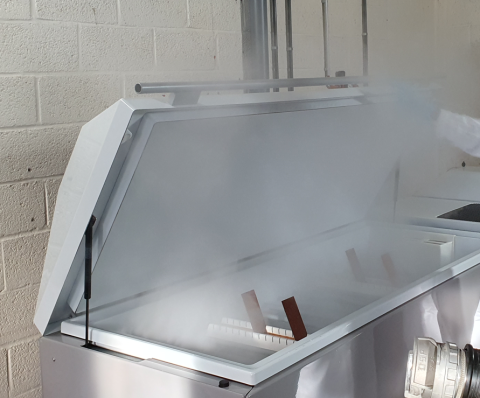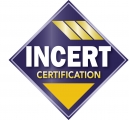
ANPI conducts salt spray corrosion tests
The use of metallic materials has many advantages. Nevertheless, oxidation can have a significant impact in terms of aesthetics but especially in terms of mechanical characteristics. In order to limit the phenomenon of oxidation as much as possible, it is essential for designers and manufacturers to carry out salt spray tests.
With this in mind, and in order to respond favourably to a growing demand from these players, ANPI has been equipped for several years with a brand new salt spray test chamber.
Salt spray corrosion test
The salt spray test (also called salt spray) is a standardised evaluation of the corrosion resistance of metallic materials. It is therefore used to verify the corrosion resistance of equipment and thus improve the reliability of products during the development, design and commissioning cycle.
How does a salt spray test work?
Numerous international standards and specifications define the test procedure and specify the conditions for carrying out salt spray tests: ISO 9227, ISO 11130, IEC 60068-2-52, ASTM B 117-85, etc.
ANPI is accredited EN ISO/IEC 17025 by BELAC (certificate number 003-TEST) to perform the following salt spray tests:
- NBN EN IEC 60068-2-11;
- NBN EN IEC 60068-2-52;
- ISO 9227 (only neutral spray (NSS));
This type of testing is also governed by various product standards, such as:
- EN 50155;
- EN 50131-4;
for which ANPI is equipped to perform salt spray tests.
Rapid degradation of a product to test and verify its reliability
We can carry out all kinds of degradation tests using different types of stresses that are best suited to the failure modes expected on these materials:
- Mechanical stresses: torsion, bending, rotary bending, mechanical shock, vibration, acoustic vibration, tension/compression, etc;
- Electrical stresses: this includes voltage, current, frequency, electric shock, etc;
- Climatic or environmental stresses: temperature and thermal cycling are the most commonly used stresses. Other stresses may be applied such as ultraviolet light, dust, humidity, etc;
- Material specific stresses.
Why accelerated testing?
Designers and manufacturers are constantly looking for ways to increase the life of equipment and achieve greater cost effectiveness while ensuring high product quality. Salt spray testing allows products to be subjected to much higher stresses than in normal conditions and therefore allows the reliability of equipment to be assessed.
You would like to receive further information about our test: laboratoires@anpi.be
You would like to receive a quotation: sales@anpi.be






